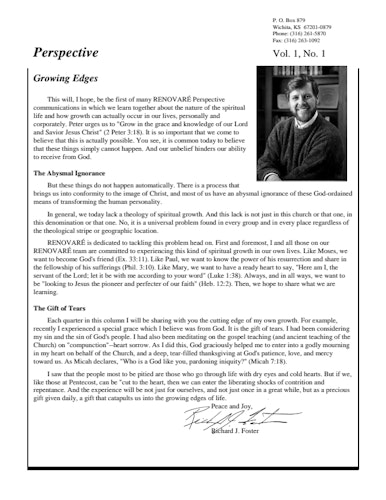This will, I hope, be the first of many Renovaré Perspective communications in which we learn together about the nature of the spiritual life and how growth can actually occur in our lives, personally and corporately. Peter urges us to “Grow in the grace and knowledge of our Lord and Savior Jesus Christ” (2 Peter 3:18). It is so important that we come to believe that this is actually possible. You see, it is common today to believe that these things simply cannot happen. And our unbelief hinders our ability to receive from God.
The Abysmal Ignorance
But these things do not happen automatically. There is a process that brings us into conformity to the image of Christ, and most of us have an abysmal ignorance of these God-ordained means of transforming the human personality.
In general, we today lack a theology of spiritual growth. And this lack is not just in this church or that one, in this denomination or that one. No, it is a universal problem found in every group and in every place regardless of the theological stripe or geographic location.
Renovaré is dedicated to tackling this problem head on. First and foremost, I and all those on our Renovaré team are committed to experiencing this kind of spiritual growth in our own lives. Like Moses, we want to become God’s friend (Ex. 33:11). Like Paul, we want to know the power of his resurrection and share in the fellowship of his sufferings (Phil. 3:10). Like Mary, we want to have a ready heart to say, “Here am I, the servant of the Lord; let it be with me according to your word” (Luke 1:38). Always, and in all ways, we want to be “looking to Jesus the pioneer and perfecter of our faith” (Heb. 12:2). Then, we hope to share what we are learning.
The Gift of Tears
Each quarter in this column I will be sharing with you the cutting edge of my own growth. For example, recently I experienced a special grace which I believe was from God. It is the gift of tears. I had been considering my sin and the sin of God’s people. I had also been meditating on the gospel teaching (and ancient teaching of the Church) on “compunction” – heart sorrow. As I did this, God graciously helped me to enter into a godly mourning in my heart on behalf of the Church, and a deep, tear-filled thanksgiving at God’s patience, love, and mercy toward us. As Micah declares, “Who is a God like you, pardoning iniquity?” (Micah 7:18).
I saw that the people most to be pitied are those who go through life with dry eyes and cold hearts. But if we, like those at Pentecost, can be “cut to the heart, then we can enter the liberating shocks of contrition and repentance. And the experience will be not just for ourselves, and not just once in a great while, but as a precious gift given daily, a gift that catapults us into the growing edges of life.
Peace and Joy,
Richard J. Foster
Text First Published January 1991


